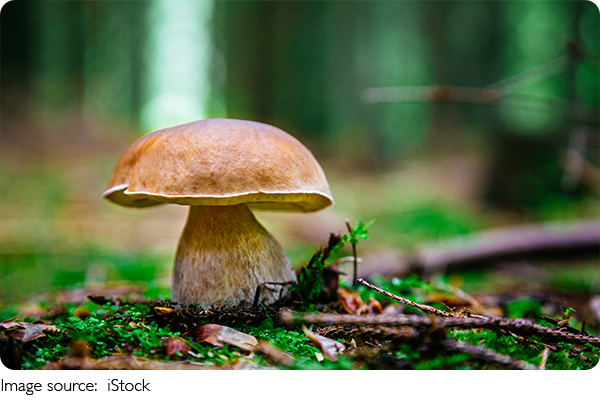Mushrooms Are Different

Mushrooms are nature's hidden marvels—silent, mysterious, and utterly fascinating. Unlike the green plants that surround them, they emerge from the shadows, thriving in damp soil, decaying logs, and even the cracks of urban sidewalks.
Belonging to their very own group called fungi, some mushrooms appear delicate, with caps like tiny umbrellas, while others grow in strange, otherworldly shapes, resembling coral, shelves, or even alien lifeforms. Let's find out why mushrooms are so different from plants and what makes them special.
No sunlight? No problem!
One big difference between mushrooms and plants is how they get energy. Plants use sunlight to make their food through a process called photosynthesis. They have a green pigment called chlorophyll, which helps turn light into energy. Mushrooms, however, do not have chlorophyll. That means they can't make their own food from sunlight. Instead, they absorb nutrients from dead or living matter—kind of like recyclers in nature.
Fungi have a unique body structure
If we dig a little below the surface, we'll see that mushrooms are just one part of a larger organism. Most of the mushroom's body is actually underground, made up of a network of thread-like structures called mycelium. This hidden web helps fungi spread out and absorb nutrients from their surroundings. Unlike plant roots, which mainly absorb up water and minerals, mycelium breaks down complex materials like wood and leaves.
Cell walls: not quite the same
Both mushrooms and plants have cell walls, but what's inside them is different. Plant cell walls are made of cellulose, while fungi cell walls are made of chitin—a material also found in insect shells. That might not seem like a big deal, but in biology, it's a major difference. This is one of the key reasons scientists place mushrooms in their own kingdom.
Reproduction works differently
Plants usually reproduce with seeds or spores, and while mushrooms do release spores, the process is unique. Mushrooms often release millions of tiny spores from the underside of their caps. These float through the air and settle in new places, where they can grow into new fungi. Unlike most plant seeds that need sunlight and soil, fungal spores only need moisture and the right organic material to start growing.
More closely related to animals
Here's something really surprising: mushrooms are actually more closely related to animals than to plants. This might sound strange, but when scientists look at the way fungi process nutrients and the types of molecules in their cells, they find more in common with us than with trees or flowers. Fungi also store energy in the form of glycogen—just like animals—while plants use starch.
Mushrooms are nature's recyclers
Mushrooms play an important role in keeping nature clean and balanced. As decomposers, they break down dead plants, animals, and organic waste into simpler substances. This recycling process returns nutrients back into the soil, helping new life grow. Without fungi, forests would be buried in layers of dead leaves and fallen trees. So, mushrooms are like silent clean-up crews that keep ecosystems running smoothly.
They deserve their own kingdom
Because of all these major differences, scientists have given mushrooms and other fungi their own kingdom—separate from plants, animals, and bacteria. This kingdom includes not just mushrooms but also molds and yeasts. From bread rising in your kitchen to wild mushrooms in the woods, fungi are everywhere—and they're doing more than we realize.
Let's take a second look at mushrooms
Next time we see a mushroom, let's remember it's not a plant pretending to be one. It's a fungus—quiet, complex, and incredibly important to life on Earth. Whether it's helping trees grow, breaking down dead wood, or adding flavor to our meals, mushrooms are true unsung heroes of the natural world.

Have you ever picked or grown mushrooms?
If you've ever picked wild mushrooms, grown them at home, or even just admired them on a walk, we'd love to hear your story. What fascinates you most about these unique organisms? Share your thoughts—nature is full of surprises, and mushrooms are one of its best-kept secrets!
-
 Cactus Water SecretWhy can cacti store so much water? It's not magic—it’s smart survival design for life in the desert!
Cactus Water SecretWhy can cacti store so much water? It's not magic—it’s smart survival design for life in the desert! -
 Insect-Eating PlantsWhy do some plants eat bugs? It's not out of hunger—it’s a smart way to survive in tough environments!
Insect-Eating PlantsWhy do some plants eat bugs? It's not out of hunger—it’s a smart way to survive in tough environments! -
 Sesame Growth TruthHow Does Sesame Grow? The Real Plant Might Surprise You With Its Growth Pattern!
Sesame Growth TruthHow Does Sesame Grow? The Real Plant Might Surprise You With Its Growth Pattern!